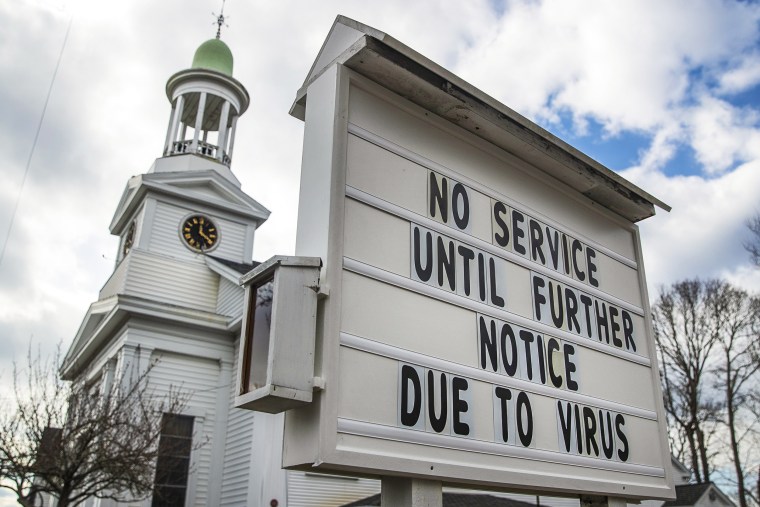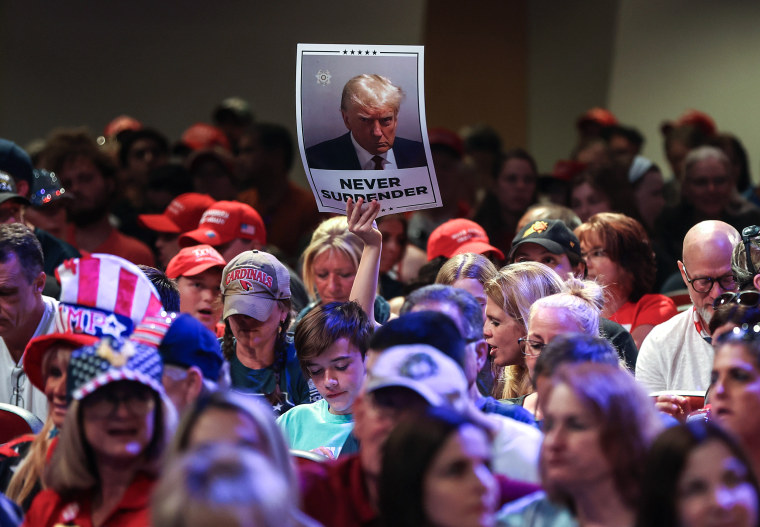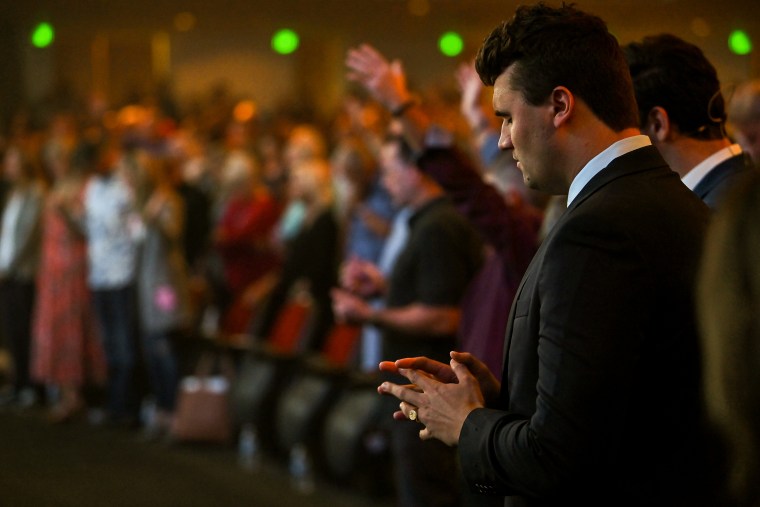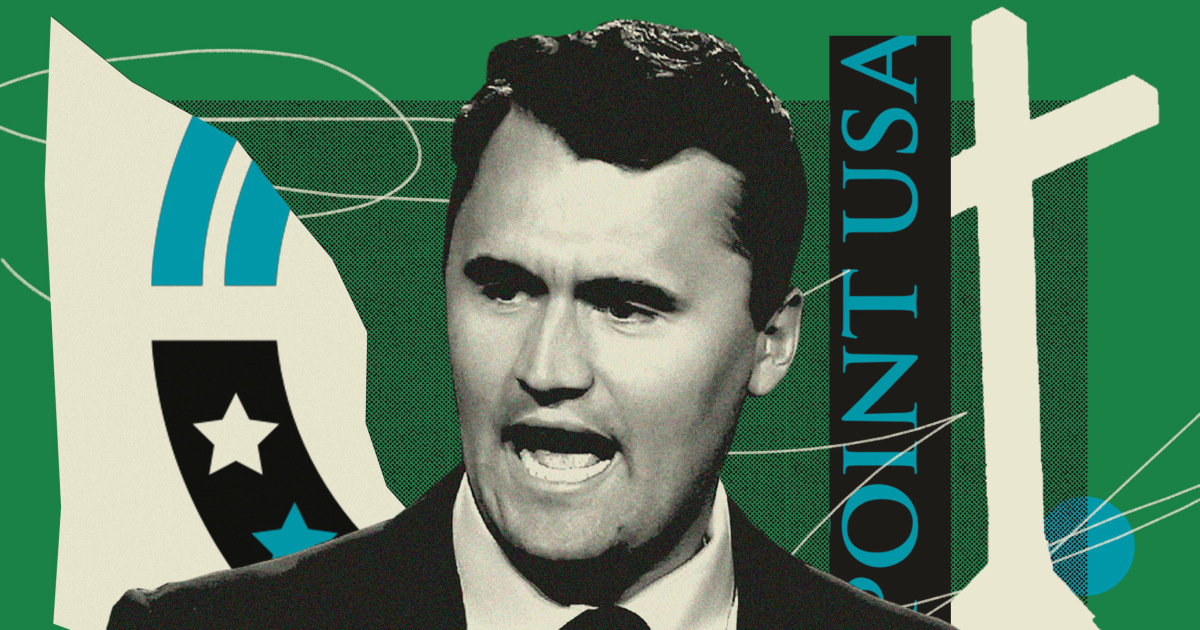Six years ago, Charlie Kirk, a right-wing provocateur who founded the conservative activist group Turning Point USA, strongly criticized the evangelical political movement he now helps lead.
Kirk, known then primarily for his work mobilizing college-age Republicans, described Jesus as welcoming and tolerant and denounced Christians’ “sanctimonious approach” to homosexuality and other issues. He argued politics should be advanced through a “secular worldview” and slammed attempts by the evangelical right, beginning in the 1970s, to “impose” their version of morality “through government policy.”
“We do have a separation of church and state,” Kirk told the conservative commentator Dave Rubin in 2018, “and we should support that.”
Kirk, now 30, has since reversed his position. It’s a transformation that, according to political and religious scholars, embodies and reinforces a growing embrace of Christian nationalist thinking within the Republican Party in the era of Donald Trump.
“There is no separation of church and state,” Kirk said on his podcast in 2022. “It’s a fabrication. It’s a fiction. It’s not in the Constitution. It’s made up by secular humanists.”
Today, Kirk and Turning Point are dominant forces in the Republican Party and MAGA movement, working directly with the Trump campaign on voter outreach while reaching millions of listeners through Kirk’s daily radio show and podcast. Along the way, Kirk has become one of the nation’s most prominent voices calling on Christians to view conservative political activism as central to Jesus’ calling for their lives.
Kirk routinely rails against what he calls the “LGBTQ agenda,” which he claims is harming children. He has invoked the Seven Mountains Mandate, a philosophy increasingly popular among Trump supporters that calls on conservative Christians to claim positions of power in seven key mountains of society, including government, media, business and education. And he promotes Trump as crucial to restoring Christian morality in America.
“I worship a God that defeats evil,” Kirk said last week while introducing the former president at a rally hosted by Turning Point and the Trump campaign at an Arizona megachurch. “And we worship a God that wins in the end.”
By appealing to conservative Christians’ fears of shifting cultural norms around LGBTQ acceptance, and by portraying the election as part of a spiritual struggle, Kirk and Turning Point are banking that they can drive evangelical turnout to secure Trump victories in key swing states. But extremism experts warn that this framing — the idea Trump is on a mission from God to restore Christian righteousness in America — could lead followers to take radical action if he doesn’t prevail in November.
“There’s this growing sense that American politics are so broken,” said Paul Matzko, a historian of American conservatism, “that there’s a decreasing willingness to imagine the other side being allowed to exercise power without doing it in apocalyptic terms, which fuels things like the insurrection on Jan. 6.”
Kirk, whose organization bused supporters to Washington, D.C., on Jan. 6, 2021, to rally Congress to reject the presidential election outcome, declined to be interviewed. Andrew Kolvet, a Turning Point USA spokesperson, said Kirk has never advocated for violence.
“Charlie wants to save America with words, persuasion, courage and common sense,” Kolvet said. “The left is desperate to conjure up some Christian boogeyman that simply doesn’t exist. We’re telling churches: Either get involved and have a say in the direction of your country or you’ll leave a void that someone else who doesn’t share your values will fill.”
Kirk grew up attending church in the Chicago suburbs and identified as an evangelical when he founded Turning Point at the age of 18 in 2012 to promote the libertarian values of “free markets and limited government.” Kirk referred to the Bible in his 2016 manifesto, “Time for a Turning Point,” but argued publicly that — much like a plumber or an electrician — it was not his job as a political activist to proselytize his faith.
“You don’t want to be too offsetting and off-putting,” he said in 2018.
Kolvet said Kirk started to become more serious about his faith six years ago, after traveling to Israel to witness the U.S. embassy move to Jerusalem during the Trump administration. But Kirk’s views on the role of religion in politics really began to shift in 2020, Kolvet said, after churches were forced to close to slow the spread of Covid, which Kirk and others depicted as an attempt by a tyrannical government to control Christians.
A year earlier, Kirk says he’d begun meeting with California megachurch pastor Rob McCoy, who helped convince him that America was a Christian nation whose founding documents were derived from the Bible. (Although some Founding Fathers wrote of the importance of religion in maintaining a virtuous society, historians dispute the notion that America was established as an explicitly Christian nation.)
In 2021, Kirk and McCoy created TPUSA Faith, a division of Turning Point USA, to mobilize conservative Christians to advance their vision.
“Charlie was just like, ‘Listen, we’re going to rally the churches and tell them that it’s OK to have political opinions about transgender surgeries for minors, about keeping your churches open during Covid and registering voters,’” Kolvet said.

Kirk’s political and spiritual metamorphosis was followed by a surge in donations and media attention that helped turn him into a leading GOP power broker — credited in February with helping push out Ronna McDaniel as Republican National Committee chairwoman, which further tightened Trump’s grip on the party.
Matzko, a recent fellow at the Cato Institute, a libertarian think tank, said Kirk has aligned himself with a once-fringe strand of apocalyptic political theology popularized by a network of Pentecostal and charismatic Christian influencers in recent decades. With the Seven Mountains Mandate as a key organizing principle, ambassadors of this movement — sometimes referred to as the New Apostolic Reformation — present politics as a spiritual clash between good and evil and Trump as a generational leader ordained by God to save America from the forces of darkness.
“He’s pitching his message to people who do believe that we’re in the end-times, and that if we don’t seize the Seven Mountains of cultural influence, then the other side, the satanic side, will,” Matzko said. “That sense of threat, that sense of anxiety, it just drips from his comments.”
In 2021, soon after launching TPUSA Faith, Kirk told a church congregation in Washington state that it was time for Christians “to rise and stand.” He then quoted a Bible passage from the book of Luke often cited by Seven Mountains adherents to make the case that Christians are meant to rule over society until Jesus returns: “The Bible says very clearly,” Kirk said, “to ‘Occupy until I come.’”
Kirk has closely aligned himself with leading figures promoting the Seven Mountains worldview, including Lance Wallnau, a self-identified prophet who coined and popularized the concept two decades ago. Kirk has appeared on “FlashPoint,” a national TV program that’s won viewers with a blend of pro-Trump political commentary and prophetic messages about God’s divine plans for America. And he has partnered with Sean Feucht, a Christian musician who’s been hosting political worship rallies at all 50 state Capitols to promote the idea of a Christian America.
“We want God writing the laws of the land,” Feucht said at a TPUSA Faith-sponsored event outside the Wisconsin statehouse last year. “Guilty as charged.”
This mindset, which can be traced to the Moral Majority movement of the 1970s and ’80s that Kirk once condemned, has helped fuel recent GOP initiatives chipping away at church-state separation. That includes the Alabama Supreme Court’s decision imperiling women’s access to in vitro fertilization, and a wave of state bills to display the Ten Commandments in classrooms, place religious chaplains in public schools and require students to learn from the Bible. Trump has also sought to court pastors and voters who believe America was meant for Christian rule, promising if elected to restore evangelical power in government and to begin screening immigrants based on their faith and rejecting any who “don’t like our religion.”
With more than 30 full-time staff members, according to the group’s website, TPUSA Faith has worked to create a nationwide network of churches to wage political and spiritual warfare against Democrats by mobilizing pastors and registering Christian conservative voters to restore “traditional biblical values in our nation.”
Kirk often paints political opponents as evil. The “woke” left, he told an estimated 1,100 church leaders gathered last year for the TPUSA Faith Pastors’ Summit in Nashville, Tennessee, has tried to silence conservative Christians.
“They want a passive church,” Kirk warned, before alluding to the passivity of churches in Nazi Germany. “They want an obedient church.”
Matthew Boedy, a rhetoric professor at the University of North Georgia and a Turning Point USA critic who’s writing a book about Kirk’s adoption of the Seven Mountains Mandate, said he views Kirk’s political and religious transformation as more of a symptom, rather than a cause, of the Republican Party’s embrace of these ideas.
“What Charlie’s doing is not new,” Boedy said. “He’s repeating phrases and lines and themes that have been around for a long time, but he’s telling it to groups of people that either have not heard it before or are not as familiar with it, and he’s translating it into more populistic language that a new generation can understand.”

Kirk’s message is resonating with voters who believe Christian values are under attack and that Trump will protect them.
Dana Morrison-Miller, 62, a two-time Trump voter from Phoenix, was in the audience at the Trump rally hosted by Kirk and Turning Point last week in Arizona. She told NBC News she believes unsubstantiated claims the 2020 election was stolen. Among her sources of information, Morrison-Miller said, are Kirk’s podcast and Elijah Streams, an online program where self-identified prophets and apostles preach about the Seven Mountains and the spiritual struggle to put Trump back in the White House.
Asked if she has confidence in the 2024 vote, Morrison-Miller said: “The only confidence I have is in God and then all of these people that are rising up and just saying enough.”
“It’s in God’s hands,” she added, “and America, if we will humble ourselves and pray and seek God’s face and turn from our selfish, wicked ways, I believe God will hear and heal this land.”
Miles Smith IV, a history professor at the conservative Hillsdale College in Michigan, described the undercurrent of Kirk’s effort as an attempt to reach “folk Christians” — those who may not be deeply religious, but identify as Christian culturally and feel under attack in a secular society. These voters, Smith said, are more motivated by right-wing populism’s nationalist and anti-elitist framing than strict adherence to religious doctrine.
“I think that maybe someone like Charlie Kirk has kind of decided that Christianity is the best way” to advance a populist agenda, Smith said. “I don’t think that people wake up and say, ‘Oh, well, [I’m] Christian now, that’s why I’m going to be populist.’ I think they are populist, and maybe they use Christianity as a buttress for it.”
Unlike Trump, however, who has promised to empower evangelicals but isn’t particularly steeped in their culture — having famously mispronounced a book of the Bible as “Two Corinthians” — Matzko said Kirk speaks the language. When Kirk talks about the need for Christians to view the presidential election as part of a spiritual struggle to save “Western civilization,” he often cites scripture to support his argument.
“He really understands these things,” Matzko said. “His rhetoric reminds me of someone who buys it.”
In a February interview with Wallnau, the Seven Mountains evangelist, Kirk announced what he called “Project 81,” an initiative to rally church leaders in swing states to push evangelical support for Trump above 81% — the key, Kirk said, to GOP victory in November.

Speaking at an Arizona megachurch in March, Kirk primed his followers for the possibility their efforts could fall short. If that happens, Kirk told them they needed to be ready to continue the fight, which he described later in his remarks as “a spiritual war first and foremost.”
“There are demons that are at work,” Kirk said. “The mantra for all of us should be … ‘Lord use me. How can you use me for your purpose to advance the kingdom of God here on Earth.’ And so it’s a full-court press now until November.”
During his conversation with Rubin back in 2018, Kirk warned that the approach to politics and religion he now embraces increased the odds of Republican defeat.
Regular voters, Kirk said, “don’t want to have to live the way some Christian in Alabama” wants them to live.
“When we start to say we should support this law because it’s the Christian thing to do,” he said, “that has turned people off for the last 30 years.”















